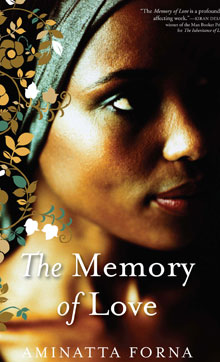
PTSD Forna’s artful narrative brings us slowly into stories that might otherwise be too horrific to digest. |
Letting go is never easy. No matter what our reasons, every move we make away from someone we once loved involves regret. In a normal life, this can be bittersweet, tinged with melancholy and the sweetness of memory. In the aftermath of brutal civil war, the sadness is likely to be more palpable: absence as a wound.
Perhaps, as one character in Aminatta Forna's new novel says, these feelings are always linked. "People are wrong when they talk about love at first sight," he argues. "It is neither love nor lust. No. As she walks away from you, what you feel is loss. A premonition of loss." That visceral grief takes many forms in Forna's fictional world — regret, as much as love, defines this devastating novel.
The London-based Forna recounted her family's experience in Sierra Leone in the memoir The Devil That Danced on the Water (2002). The Memory of Love, her second novel, begins calmly enough. Sierra Leone, present day, is far from happy, but it is at peace as Adrian Lockhart, a British psychiatrist, begins his rounds. He's an outsider in Africa, running from an unsatisfying marriage back home. He has come to treat the array of post-traumatic stress disorders that have followed years of fighting, but his experience is little use in a wrecked country that has thrown victims and aggressors alike into non-stop waking nightmares. To Kai Mansaray, a Sierra Leonean surgeon, he is a "tourist," full of good intentions but lacking any connection to the land that Kai, unlike most of his family and friends, is reluctant to leave. Because of a shortage of living quarters, the two become friends, but it's an unequal friendship, built on expediency. Only one patient, the elderly Elias Cole, really seems open to the kind of talking cure Adrian knows best. But the tales Elias tells of the bad days are not the entire truth, at least not the truth Kai experienced.
As in Forna's first novel, Ancestor Stones (2006), women serve to bring all these stories together. This time out, however, most of the story is narrated in alternating sections by the men who orbit these elemental but often silent women. From Elias, we learn of the graceful Saffia, who's married to the dreamer Julius. Elias served as junior faculty under Julius at the local university, but it was the diffident Saffia who ruled his thoughts. For Adrian, it's the tough Mamakay, whose opacity as much as her beauty draws him. Kai's history remains a mystery for much of the book, though he is the one to unravel the enigma of Agnes, whose regular breakdowns hint at something in her past. The way Forna writes it, these women were the primary victims of the wars, and the ones expected to pick up and move on. The men, those who survived, rarely can; they tell and retell their tales and run from memories that reveal their cruelty, weakness, and utter helplessness.